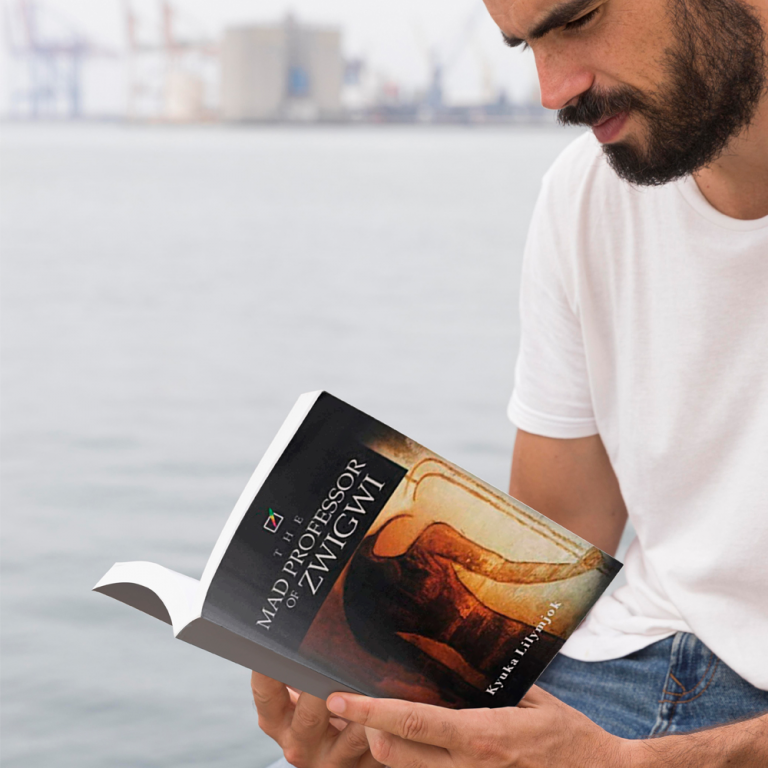Rosemary Asen
Department of Theatre Arts
Benue State University, Makurdi.
rosemaryasen@gmail.com
Abstract
This chapter undertakes an evaluation of Kyuka Lilymjok’s The Lord Mammon focusing on characterization, thematic preoccupation of the novel, style and techniques employed by the author. The chapter contends that the author’s characterization is apt as he uses a unique literary style in this novel that has become his signature and trademark in the universe of his fiction. Overall, the paper concludes the novel has depth and throws light on topical issues prevalent in the Nigerian society.
Introduction
Contemporary African writing focuses increasingly on issues that are prevalent in society. In this regard, there is often a desire by writers, particularly old writers on the continent, to engage in works that will help inspire change of prevalent happenings in society they perceive bad. This is in line with the social commitment that is the hallmark of the African writer. Thus writers like Chinua Achebe, Wole Soyinka, Niyi Osundare, Hyginus Ekwuazi, Maria Ajima, Dul Johnson, Chuma Nwokolo, E. E. Sule, Ama Ata Aidoo, Sousa Jamba, to mention a few, have at different points in time with remarkable success discharged their social responsibility to the continent by writing on the ills of their time.
This chapter undertakes a critical reading of Kyuka Lilymjok’s The Lord Mammon noting its characterization, thematic preoccupation, style and techniques showing how much of a socially committed artist Lilymjok is.
Overview of The Lord Mammon
The Lord Mammon written by Kyuka Lilymjokis a 215 page novel divided into thirty chapters. The novel tells the story of three major characters – Pastor Gojang, the Prince, and Josira. These three characters all have one thing in common: pathological love of money. Pastor Gojang starts a church because of the financial success of his friend Pastor Wollia whose church made him very rich. Every action Gojang takes in his church is calculated to make money from his congregation. Unfortunately, he is not as lucky as his friend, Wollia.
The Prince was brought up in poverty and squalor. He grew up to hold his father, a devote Christian responsible for the poverty of his family. His parent’s lack of money seemed to make him have an unusual love for money. Obsessed with money, he comes to see it as a god – the Lord Mammon (p. 31).
Josira is a lady of easy virtue who for money can be anyone’s mistress. She is one of a pair of twins. ‘‘As her twin brother Lonkoj was born with an Oedipus complex, she was born with an Electra complex; and as he was obsessed with money, she was possessed by it’’ (p. 36).
Characterization in The Lord Mammon
Characterization in The Lord Mammon is such that the people are mainly creatures of unimaginable evil. They are majorly flat characters that seem to have at some point undergone pupillage at the devil’s inn. Readers do not get to see any other side of their nature from the beginning to the end of the novel. The plot of the story is a simple one that chronicles the life and activities of the three major characters until they meet their doom at the end of the story.
The major characters in the novel are Pastor Gojang, the Prince, and Josira. The writer depicts these characters in line with his pre- occupation of projecting various kinds of evil people are capable of.
Pastor Golang is the first major character of the novel. He is intelligent and eloquent. These qualities help him in his efforts to con his flock into doling out money to the church:
He was intelligent, he could preach with tongues of fire, he could persuade. What could he not do (p.48).
Pastor Golang is highly materialistic. His only objective in establishing his church is to enrich himself. His umpteenth sermons in his church are on generous offering. When preaching on offering does not drain into his pocket the kind of money he needs, he goes to a seer for the magic wand that will bring the money (p.114).
Though intelligent, greed makes Gojang gullible. Desperate for money, when the seer tells him to secure red mercury which he can use to invoke money, he does not doubt the seer for a moment. (p.121)
He is desperate and ridiculous. Desperation for money makes him dress as a nurse to go to a hospital to steal red mercury. (p.167)
He is suspicious. He suspects the financial secretary of his church of pinching church offering when counting same. (p.86)
He is a thief. Going to the hospital to steal red mercury is theft. Even he confesses that he often feels like an armed whenever he threatens his flock with hell to get money from them. (p.166)
He is a liar. He lies to his wife he slept in the church praying for faithfulness of the flock in the church’s forthcoming harvest when in fact he has gone to consult a seer. (154)
He is morally bankrupt and does not fear God. He sleeps with Josira in the pastorium. (p.190)
The Prince is the second major character of the story. He is an extremely intelligent man. “a man of extraordinary intelligence, possessing a razor-sharp mind” (p.30).
He is a heartless man who is not associated with any good deed from the beginning of the story to the end. His evil nature manifested on the day of his birth. It is stated that “bats kept rustling in and out of the dongo tree behind their house on the day he was born and other children fell sick that day as if protesting his coming into their world” (p.32).
The Prince is also portrayed as a self-centred man who evaluates circumstances and happenings drawing only from the material world he could see, and it was one he should grab whatever tends to his comfort with the only consideration and care that he was not caught taking it (p. 31).
He has no filial feelings. He killed his younger brother because he toyed with his radio (p.35).
He is a violent man. Apart from the murder of his young brother he commits many other acts of violence in the story. These include murdering the two wives and children of the leader of Timani fishermen and other people in the course of his armed robbery activities. Human beings do not mean anything to him (55).
He is very calculative and well organized in the armed robbery activities he organizes for his gang. An example is the success of his gang in robbing the National Bank (p.175).
He is cultic. He associates with snakes. A snake is always at the centre of worship during meetings of the Cimmerian Brotherhood. The snake is usually invoked to verify the sincerity of the oath of loyalty taken by the Cimmerian brotherhood (p.7).
Josira is the third major character. She is immoral and materialistic (p.22). She has an incestuous relationship with her father at an early age and continues from there till the end of her life living with several men as mistress (p.40).
She lacks training in any seeming profession; so she hawks her body. Though not a full time prostitute, she is a mistress to different men at different times. At a particular time, she gets involved with a gigolo known as Serto Sangali to be able to satisfy Heniah who she lives with (107). She also gets involved with Pastor Golang and meets her death when Makol her lover at that time caught her in the act with Pastor Gojang (p.190).
Josira is also capable of great violence. This is exemplified by her murder of Kargan her second lover after leaving her father to cohabit with him (p.65). He maltreats her by not providing for her, often leaving her to starve. She retaliates by murdering him through severing his genitals with a sharp knife when he falls asleep.
Minor characters in the story include other members of the Cimmerian Brotherhood: Makol, Dikask, Yomoyo, Jirimi and Kokoto. They are all armed robbers with specialties that advance their vocation.
Another minor character is Imam Balako who buries his chaplet and amulets in a money-making ritual recommended for him by a marabout (p.196)
Major Themes in The Lord Mammon
The major themes of the novel are clergy men chicanery and artifice, and the haunting gospel of salvation of an armed robber. Pastor Gojang is the main character through who we see the chicanery and artifice clergy men deploy to con their flocks into parting with wads of money to the church. In chapter one of the novel, Pastor Gojang floats his strategem of funnelling money out of his flock. Using verses from the Bible he says money is the beast the Bible talks about:
The beast in the verses we just read is a literal and metaphorical beast. The literal beast is a monster that would come at the end of time. The metaphorical beast is money, which is already here with us. The beast God revealed to John in the verses we read comes from the earth and money is on earth. The beast does a lot of wonders and money does a lot of wonders. The beast deceives those who dwell on earth; so does money. Men worship the beast; so do they money. Small and great, rich and poor, free and bound all receive the mark of the beast on the right hand or on their foreheads; so do all these classes of people carry money with them. No one can buy or sell in the market save he that has the mark or name of the beast. No one can buy or sell in a market that has no money. I can go on and on,’ he pontificated and paused for what he said to sink into the minds of his flock (p.2).
When he felt what he said had sank, he goes on:
In the verses we read, money is the beast while the love of it the mark of the beast,’ he went on with the fervent mien of a man who had recently held discussions with God. ‘The beast does not take a man to hell. In fact the beast can be used to help the needy and spread the gospel. When used for these good purposes, money is no longer the beast but holy water. It is the love of money – the mark of the beast that is a passport to hell. The love of money turns the hand of a man into a fist that sprinkles no holy water. A fist, let it be known, is a barren ground. Nothing comes out of it. It is a pregnancy that delivers no succor for anyone; it is a bulge of heartlessness; it is a bud that does not burst open for bees to gather honey; it is a forehead with the mark of the beast. No man can worship God or bless another with a fist. As it is with man, it is with God. God does not bless people with fists but with open palms. It is the open palms a man worships God with or uses to bless other people that God uses to bless him. A man with the mark of the beast either on his forehead or hand is a worshiper of Mammon. For him, it is to hell o Israel. No doubt, he would buy and sell in all the markets of the world; but so would he be admitted to all the hells of the infernal region (p.3).
Then he delivered the sucker punch:
By special grace, it has been revealed to me that it is the metaphorical mark of the beast – the love of money that would deliver a literal beast in the end of times. And the beast so sired would devour only those who carry the mark that begot it. Let those who carry the mark of the beast hear what the Holy Spirit says to the church’ (p.3).
Kyuka Lilymjok is a consummate literarist who pushes literary expressions to their border with absurdity where they cross the border not into absurdity but into the realm of poetry. In the above exegesis of the bible, he pushes literary expression to the border with the absurd where it crosses the border not into absurdity but into poetry.
In the above exegesis of the Bible Pastor Gojang sought to establish hatred of money in members of his church so that they will pass to the church and by extension to him substantial amounts of the money they make in their various endeavors. The irony of the situation is that while decrying the mark of the beast in his flock, he carries the mark in his heart.
The threat of making hell by being branded with the mark of the beast – the love of money that prevents members of his church from donating generously to the church should be enough persuation if not coercion for them to donate generously for God’s work.
Sunday after Sunday, Pastor Gojang hits the pulpit with one sermon: the imperative of fat offerings. ‘Give your widow’s mite,’ he thunders church service after church service:
The widow’s mite; that is what you should bring to the house of the lord Yahweh,’ Pastor Gojang repeated again, reaching for the umpteenth time for his handkerchief that spent more time in transit than in either his pocket or face. ‘And I hope you all know what this means. Some of you without divine understanding I believe are wont to give a literal interpretation to the widow’s mite with all its absurdities and annoyance to the lord Yahweh: The interpretation that widow’s mite means nothing is too small to be given to God. Brethren, such an interpretation is bound to lead to absurdity and mischief. Speaking in accordance with divine inspiration, widow’s mite means widow’s might. It means giving God all that one has, not the base, the rotten or the despised of one’s possessions. The widow from whom the expression derived its popularity had nothing but the farthing she gave to God. Therefore, she gave all she had. So likewise, if three cars, two houses, five shoes or whatever, are your possessions, you should give all to the Lord Yahweh to be deserving of giving your widow’s mite. This, brethren, is what the scripture is saying regarding the giving of one’s widow’s mite,’ he said, expanding his chest in tune with the expanding spiritual inspiration in him (p.30).
Then he will go on to talk of the blessings of a generous faith:
The story of Abraham in the Bible, he said was a story of common knowledge to all believers. But why Abraham who was a blessed man became the source of others’ blessings he said some people might not know. Abraham’s faith was the source of his own blessing; but it was the generosity of his faith that was the source of others’ blessings. ‘So quick was Abraham to generous faith that before God offered his only begotten son Jesus Christ as sacrifice for the sins of humanity, Abraham had since offered Isaac his own only begotten son as sacrifice to God,’ he pontificated. ‘A man of the world then may say that Abraham taught God generosity of faith, but we here seated know better than that,’ he went on in a rebuking tone. ‘Remember the widow of Zarephath!’ he cried after a long meditative pause. ‘By her generous faith, she fed the man of God – Elijah. Her generous faith was the source of her own blessings and also the source of blessings for her only child. The Philippians, whose generous faith attended to Paul’s material needs, God attended to their own material needs by a bountiful blessing. The miserly disposition of Ananias and Sapphira was the curse that claimed their lives, and the treasures they had cornered by deception, whose shall they be? Let the miserly continue in the folly of their wisdom. They will surely reap the miserly reward of their planting in Gehanna. He who will eat alone the handful meal in his barrel in fear of a thin death, will certainly find a fat death waiting for him at the end of his meal. But he that will share his handful meal with a man of God in the hope of replenishment will certainly find a fat salvation at the end of his meal. Cast your bread upon the waters and you will find it after so many days (p.183).
For Gojang, his church is not about Jesus Christ, God or the Holy Spirit; it is about money, hence The Lord Mammon. He had even heard that some demonic members of the church instead of referring to the church by its consecrated name of Give Christ the Glory Church have taken to calling it Give Gojang the Money Church.(168).
Pastor Gojang’s story reflects the situation in contemporary Nigeria where the aim of many new generation churches’ pastors is making money out of their congregations. Most of their sermons focus on offering and tithes. Some even go to the extent of patronizing native doctors for diabolical means to attract large congregations who will give generously to their churches.
Unfortunately for Pastor Gojang, his sermons which he thinks are heart-melting instead of melting fists into his pocket seem to be hardening fists. He is bewildered and thinks there is something he is not getting right despite his assessment of himself as a great preacher. Since Pastor Wollia has been shoveling in the money while he has only been raking it in, he will invite Wollia to preach in his church on fat offerings so that he would learn how his model has been doing it. Twice he invites Wollia to preach in his church; twice very little money is realized as offering. He is now more deeply troubled. Not finding the trick he needs from Wollia, he goes to a seer for fetish means of enchanting his followers to perform.
The Prince the second major character in the novel peddles a haunting gospel of salvation. He always cringes when he remembers his expeience with poverty in childhood. His family could not have breakfast, though they fasted more than anybody having not eaten the previous night. The wretched meal that passed for their breakfast and dinner rolled into lunch was, to use his words, bound for the pigs but steered towards them by poverty (p.33). He had only two shirts and only one trouser that had lost its seat; the shirts covered with holes and patches. He had neither shoes nor a sweater to protect him from the cold during harmattan. …. He and his siblings had to trek five kilometers barefooted, and often on empty stomachs to get to the school. As gravel pinched their bare feet supporting flagging bodies, children better circumstanced sped past them on bicycles and with shoes on their feet. To him, it was luxury having shoes. The child that therefore had shoes and was riding a bicycle was living a life in grandiose jest of his own (p.33). He lives in terror of his past and thinks he will be happier if he can forget his past:
The Prince was led to concoct the water of river Lethe by his terror of memory and contempt for history – his own history in particular. Memory was to him the most damnable traitor of man after sight. After a man sees the comfort that money the unjust god provides and the misery the lack of it breeds, what the eyes see is passed to memory for storage. In a way memory is a worse fiend than sight. His hatred of history arose from his understanding that history nurses memory. Undermining history therefore meant undermining memory. So he attacked history. History he would say is a scroll of derelict accounts too abject for the attention of a man of destiny, and he saw himself as a man of destiny. As such a man, he perceived himself above the crippling facts of history and proceeded to appoint future eminence a sufficient cure for historical sentiments. Historians were to him one of those anomalies fantastic academia was capable of breeding. Without such allowance, he could not conceive the ratio by which some men apply themselves to exhume the dirt of yesterday and others to patronize their ghoulish wares. Let historians and their masochistic audience like all donkeys continue to bray for the load of history. He, the prince with his fellow Cimmerians had enough guile to meet their malice and insane stupidity. He, the Prince and his fellow Cimmerians intended to go through life unmolested by history (p.14).
Detesting memory, he concocts water lethe:
To his fellow Cimmerians, perhaps nothing cast the Prince, who they also called the Wise Master, in such majestic splendor as his concoction of water Lethe – a mercuric substance said by the Prince to have been fetched by him from River Lethe which flowed somewhere in Cimmeri. When drank, this water produced amnesia the duration of which depended on the quantity taken. A little sip of the water induced amnesia lasting thirty days. The amnestic water of river Lethe was a happy antidote to the Cimmerians against the torment of conscience. It offers them an escape from the torment of memory to the bliss of forgetfulness. The moment it was taken, a thick curtain clammed down on the mind severing the past from the present and the future. The past went into oblivion for the period the effect of the water taken would last. The present and the future like a rewinding tape also moved into oblivion with the severed past. While the amnesia of water Lethe lasted, no robbery plan could be made or executed on account of loss of memory. For this reason, the water was only taken after chains of robbery operations whose proceeds would see them through the period of amnesia (p.12).
To save mankind from the affliction of sight and memory, the Prince abducts men to the darkness of Cimmeri where they cannot see and feeds them with water lethe that makes them forget. He uses money he amasses from robbery to feed his abductees.
Those considered unfit for this salvation get killed. Several people in Dameta get kidnapped by the Cimmerian brotherhood and taken to Cimmeri. The aim of the Prince is to spread abduction of people into Cimmeri to the four corners of the earth. This aspiration shows he is demented.
Josira the third major character in the novel uses her body for survival. Before breaking out into sleeping with men for sustenance, she is in an incestuous relationship with Mimono her father. When he could no longer satisfy her due to old age she leaves him for Kargan, a young man in their neighbourhood. This leads to the death of her father. After leaving Kargan, she passes through Falang, Heniah, Sangali, Makol and Pastor Gojang. Makol turns out to be her twin brother Lonkoj who runs away from home after the death of their mother due to her incestuous relationship with her father. Ironically, Makol loves her more than all other men she has been mistress to and wants to marry her until he discovers her relationship with Pastor Gojang. It is at this point she, Gojang and Makol lose their lives.
Minor Themes in The Lord Mammon
Poverty
Sub-themes of the novel include poverty. Almost all the major characters in the story grow up in abject poverty and take to crime to survive. A major character in the novel – the Prince, grows up in abject poverty:
In some way, it could be said the poverty of his parents set him on the warpath with conventional religion, and by extension, society. His parents’ lack of money also seemed to make him have an unusual love for money. Obsessed with money, he came to see it as a god (p.31).
The reprobate character the Prince becomes is largely due to the poverty of his childhood. He thinks money is a solution to all problems. As the case is with the Prince, it is with Josira. She also grows up under grinding poverty. Her father is a lazy man that leaves the upkeep of his family to his wife. Born into an empty house without food and without love, she very early in life used her body to sustain herself.
Nemesis
The novel makes the case that nemesis follow evil. At the end of the story, all the major and minor characters involved in evil acts get killed with the exception of the prince who is arrested by the police.
Style and Technique in The Lord Mammon
A major stylistic device of Kyuka Lilymjok in this novel is that characters and incidents are portrayed in exaggerated proportions. An example is the incident of poverty in the Prince’s family. The family is so poor that it can only afford a meal a day and the meal it can afford is only suitable for pigs. Due to lack of clothes, the Prince and his siblings stay indoors during severe harmattan periods to keep warm by the fire burning in the mighty hearth inside their courtyard. The intellectual capacity of the children is described as follows – “all their children before the Prince had only demonstrated high capacity for idiocy and aggravated imbecility. But here was the Prince with a towering and imposing intellect set to change all that” (p.32).
The Prince’s evil actions are also of enormous proportion. He kills his brother of three years because the child spoilt his radio. He does this by turning the boy upside down and knocking his head on the ground (p.35). His actions in Timani village, (a place he comes across in the course of running away from his village) are also immensely evil. He goes to the fishermen leader’s house to steal money. To be able to escape he kills the fishermen’s leader’s two wives described in the following manner – “with considerable violence, he drove the knife into her guts, pulled it out with the same violence and drove it into the stomach of the second woman who came blundering into the room, following the scream of her mate. The Prince was not done yet; he reached for two little children crying around the fire outside the house, tied them together with a rope and hurled them into the fire to roast with the fish roasting there, then swept out of the house” (p.55).
Josira though a woman is also capable of cold blooded murder. Her lover Kargan starves and assaults her frequently. She decides to kill him and make away with his money. On the day of her leaving him, she severes his genitals when he is sleeping, drops them on his face and fled (p.65).
Another style of Kyuka Lilymjok in this work is frequent use of allusions to religious incidents often in the Bible and other literary works. For example, when Mimono complains bitterly about Josira’s (his daughter) – loss of interest in their incestuous relationship, he compares her to the daughters of Lot who seduced their father in order to bear children and Delilah who betrayed Samson her lover (p.44). The two incidents are from the Bible. The author also refers to Kargan’s appearance to take over Josira from her father thus: ‘‘Like a protégé of Hathor – the Egyptian goddess of love, music and dancing, he came one evening when he knew Mimono would be home, spouting love the Indian fashion: in songs and dances (p.60). In addition, during a conversation between Josira and her lover Makol about the volume of love in relationships between the opposite sexes, she states: “I have checked and found you are right; Romeo, killed himself as surely as Juliet did” (p.182). This refers to Shakespeare’s Romeo and Juliet. All these are indications of intertextuality.
Other stylistic devices employed by the author include generous use of symbols. In the novel money is the Lord Mammon (p.4) – a symbolfrom the Bible. Money is established in the text as a god and worshipped as such by the major characters in the novel.
‘‘When people are obsessed with desires of things of pride, they do anything to get money which acquires all things. And so the Lord Mammon … rules supreme.’’ (p.95)
Money is not only a god, it is a common friend. It is a common friend that has no enemy. Though a god, the Prince sees money as an unjust god. According to him, “money – the Lord Mammon, may be a common friend to some people, but to many it is an unjust god” (p.4).
Money is also symbolized as a beast an allusion also to the Bible (p.3). The name the Prince is also most likely taken from the Bible. In the Bible the devil is also referred to as the Prince of this world. The Prince in The Lord Mammon given his atrocious character most likely symbolizes the Biblical prince. His constant association with snakes gives further support to this view.
Lilymjok also uses several imageries in this novel. His description of Josira’s attitude towards money:
Money to her was the healing water of River Jordan. It was the only thing she needed to turn her situation around. With the healing water of River Jordan even the withering flower can become robust again. Lack of money was a drought that was withering her. Money was the holy water of River Jordan that will cure her of the leprosy of poverty. Men were the Jordan, the source of the holy water. So she would have to device means of getting men sprinkle their water on her (p.23).
Another vivid imagery employed by Kyuka Lilymjok in the novel is the description of the futility of Josira’s search for men in a church:
Later, on a sober reflection, the folly of her choice of the church as a ground to ply her trade mocked her wisdom. Quiler birds can only be found with cows. Dip your hand into the sea and you will encounter a fish. Dip it into the scorching sand of the desert and you will find a blistery reception. (p.155)
The above examples are only a few of the various instances Lilymjok puts imagery to effective use in the novel. Metaphors, similes and hyperboles are also used by the author to accentuate effect. These enable readers to vividly visualize intended messages.
Be the above as they may, there are exaggerated portrayals of the evil nature of the characters and incidents in the story. All the major characters are monsters of sort obsessed with money. This makes the story an obvious fiction. Exaggerations, though valid in a literary piece, may however affect overall verisimilitude.
Again, some readers might be taken aback by some of the expressions used in the novel that seem more suitable for popular literature than high literature. Examples include Josira’s invitation to Kargan – “‘No, not a real hot…sweet …; I need a sweet …,’ she said with all the lewd gesticulations of a tamed prostitute. ‘Oh, how I need a sweet…” (p.65).
Another example is Falangs expression on page 80 of the novel – “has a sailor any more right to complain of Davy Jones than an idler of idle worms? What right has a pansy to complain of goo?”
A third example is Heniah’s admiration of Josira as follows – “if your backyard is as good as your frontyard, then I bet you surely have the bees and wasps after you” (p.105).
Use of Symbols in The Lord Mammon
There are three major symbols in The Lord Mammon with robust chances of universal application. All the three symbols are symbols of money or the love of it. Beginning with the title The Lord Mammon as a symbol of money, it is doubtless a powerful symbol. This symbol makes money an object of worship. Since everyone works for money, everyone is a worshipper of The Lord Mammon. If this god is at the centre of any religion, it means all mankind are adherents of this religion. If it is the god of a cult, it means all mankind are cultists.
The second symbol is the common friend symbolizing money. Money as a common friend is a literal and metaphorical expression that sits well with the facts on the ground. At the individual level, it is a common friend no one rebuffs its outstretched hand for a handshake. On one finding himself in a foreign land without human friends or relations, if he has the common friend, he has little to worry about. Without it he is in trouble. At home with the common friend, everyone seeks his friendship from relations to non-relations. As his money is a common friend, he having the money becomes the common friend of everyone. At home without money, he is fled by many and is reduced to something of a pariah.
The third symbol is the beast as money. Pastor Gojang categorizes money as a beast into two: Money itself and the love of money. Money itself is a beast already around the world, and so is the love of money. The love of money is what will deliver a literal beast on the last day.
The beast symbol is so apt in its literal and metaphorical nuances that it is liable to make Christians familiar with the Biblical beast wonder if Pastor Gojang is right in his exegesis on the Biblical beast. The reader of this novel is also liable to wonder if Lilymjok through Pastor Gojang is saying in Jericho what shouldn’t be said in Gath. He is also liable to wonder if confusion is likely to set into the church on the matter of the Biblical beast.
Conclusion
The Lord Mammon shows how the love of money destroys the noble as much as the vile. It is a novel of exceptional depth and texture that throws light on issues prevalent in the Nigerian society, particularly the love of money by the clergy. Lilymjok’s characterization in the novel is apt. In this novel again, the author shows a unique style that has become his signature and trademark in the universe of his fiction. There are a few issues that some readers and critics may have with the novel, but there is no doubt, it is a book worth reading.
Works Cited
Agema, Su’eddie Vershima. ‘Commitment and the Language of African Literature’ in Introduction to Elemental Issues in Creative Writing by Maria Ajima. Karu: SEVHAGE, 2014. Print.
Geldof, B. “All Together Now in Development” Issues 30 Second Quarter, 2005. Print.
Shior, Emmanuel “X-raying corruption in Nigeria with the Novel: The example of Abubakar Gimba’s Witnesses to Tears” in Oshionebo, Barth and Mbachaga, Jonathan (Eds) Literary Perspectives on Corruption in Africa 1 p. 74-82 Makurdi: Bookmakers, 2010. Print.
Tsaku, Hussaini, “The Theme of Corruption in Femi Osofisan’s Who is Afraid of Solarin?” in Oshionebo, Barth and Mbachaga, Jonathan (Eds) Literary Perspectives on Corruption in Africa 1 p.107-121 Makurdi: Bookmakers, 2010. Print.
Iorwuese, Hagher. Leading Africa out of Chaos: A God Centered Approach to Leadership p. 20. Ibadan: Spectrum Books Limited. 2002. Print.
Lilymjok, Kyuka. The Lord Mammon. Ibadan: University Press PLC, 2012. Print.










